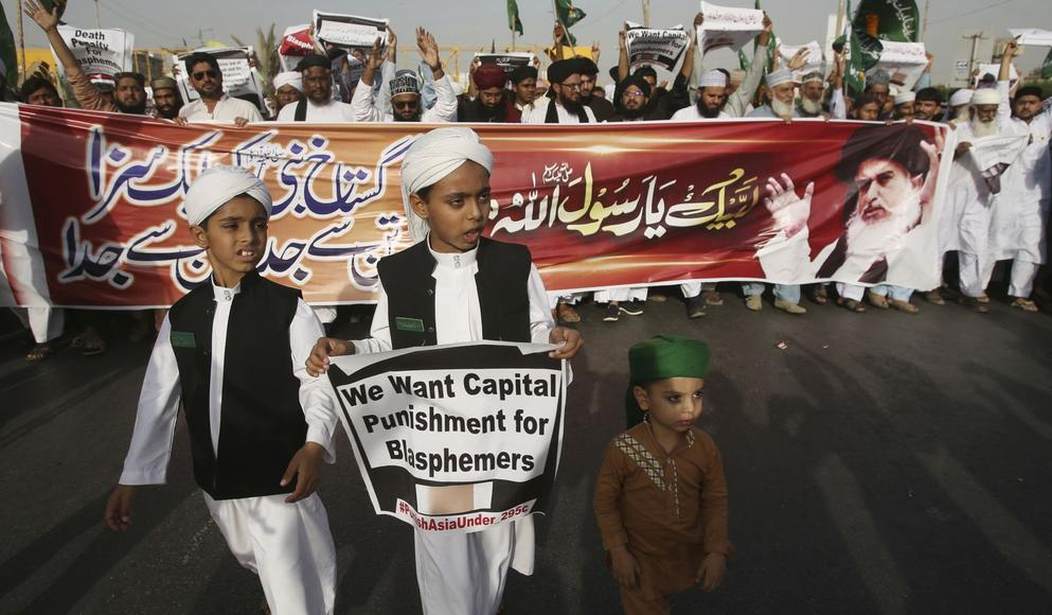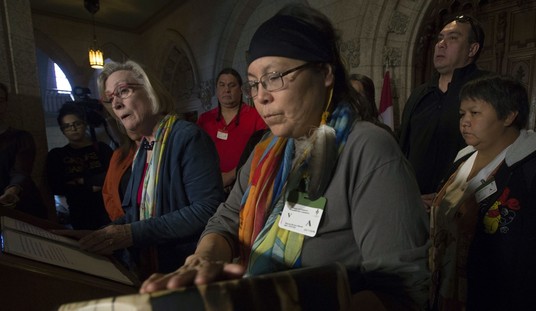Thousands of supporters of the Islamist political party Tehreek-i-Labbaik Pakistan (TLP) rallied in Lahore and other cities last Friday after the Supreme Court of Pakistan heard the final appeal of Asia Bibi, a Christian woman convicted of blasphemy in 2010:
Asia Bibi from Pakistan may become the first person to ever be executed under the blasphemy law, in a country where mobs have killed many over mere allegations of insulting Islam. pic.twitter.com/nbVtPmbJ9H
— DW News (@dwnews) October 14, 2018
The TLP warned members of the Supreme Court against annulling Bibi’s death sentence, and threatened to launch protests to shut down cities across the country in protest if she is not executed.
As I reported last week, blasphemy accusations against Christians and other religious minorities are commonplace in Pakistan, and cases of lynchings of Christians have occurred amidst terror attacks targeting Christian churches and institutions.
Bibi’s appeal was heard last Monday, and the three-member panel of Supreme Court members reserved their verdict and asked the media not to comment on the case.
The TLP, which won two million votes in the elections last July and makes enforcing blasphemy laws one of their chief political issues, warned of “terrible consequences” the day after her appeal was heard.
They then threatened any judges who would be involved in acquitting Asia Bibi:
The Tehrik-e-Labbaik has said that any judge or judges who decide to release Aasia Bibi will be deal with pic.twitter.com/QRxQ7PANm9
— omar r quraishi (@omar_quraishi) October 10, 2018
For the protests on Friday, the TLP directed their local affiliates to launch sit-ins around the country within hours of any possible acquittal to shut the country down:
One Islamic cleric closely associated with the TLP, Pir Afzal Qadri of the Aalmi Tanzeem Ahle Sunnat, issued a fatwa that any judge acquitting Asia Bibi should be punished by death:
A fatwa by #PirAfzalQadri in 1997 resulted in the #killing of a LHC judge. Qadri is now indirectly #threatening to kill Chief Justice #SaqibNisar. pic.twitter.com/QJnJ5oZmCX
— The Centrum Media (@thecentrummedia) October 12, 2018
Qadri issued a death fatwa in 1997 that resulted in the murder of retired Lahore High Court judge Arif Iqbal Bhatti, who was murdered while in his law office. Bhatti had previously been involved in the release of two Christian suspects who were accused of blasphemy in 1995.
Since then, challenging Pakistan’s blasphemy laws has proved a dangerous business.
In January 2011, Punjab Governor Salman Taseer was murdered by his own bodyguard, Mumtaz Qadri, for calling for changes to blasphemy laws.
Qadri was executed in February 2016, but his example was the inspiration for the murder of an Ahmadi follower, Asad Shah, in Glasgow, Scotland, later that year by a killer who believed he had blasphemed Islam.
The Sunni Ittehad Council, which Pir Afzal Qadri is a senior member of, opposed Qadri’s execution for Taseer’s murder. The group had previously received $36,607 from Washington in 2009 under the U.S. State Department’s Public Diplomacy Programs for Afghanistan and Pakistan.
Also in March 2011, Minister for Minority Affairs Shahbaz Bhatti, the only Christian member of Pakistan’s cabinet, was shot and killed. His assassination was claimed by the Tehrik-i-Taliban, who said that they targeted Bhatti because of his opposition to the blasphemy law and threatened to kill anyone else who raised such challenges.
If Asia Bibi’s blasphemy conviction is upheld, her only remaining appeal will be to Pakistan President Imran Khan, who expressed his support for the blasphemy laws during this past summer’s presidential campaign.
During week’s appeal hearing, the Supreme Court panel heard that the cleric who filed the charges against Bibi in 2009 wasn’t present when the incident allegedly occurred and that the statements of the two women who argued with Bibi were contradictory.
The case continues to garner international attention:
Today: Jailed since 2009, Christian mother of 5 faces final appeal on death penalty for alleged insult of Islam's prophet. Sick: majority of tweets with #Asiabibi hashtag are calling to execute her. Why is Pakistan on the UN Human Rights Council? https://t.co/oQwocOe0Ad
— UN Watch (@UNWatch) October 8, 2018
Meanwhile, calls for Bibi’s execution continue to circulate on social media.
https://twitter.com/AsifTly/status/1048597398916923393
https://twitter.com/AsifTly/status/1049238346826993664
Asia should be executed as per law. But if Christians or Americans wants to make a deal, Pakistan should set her free on two conditions.
1• Christians release Afia Siddiqui
2• Asia should be deported from Pakistan after release.#AsiaBibi #HangAsia#HangAsiaBibi @JaySekulow https://t.co/zcNmYQOsow— Israr Khan (@i5rar) October 8, 2018
The Supreme Court has not announced when it’s verdict will be released.









Join the conversation as a VIP Member